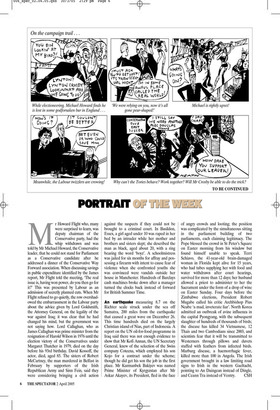PORTRAIT OF THE WEEK M rHoward Flight who, many were surprised
to learn, was deputy chairman of the Conservative party, had the whip withdrawn and was told by Mr Michael Howard, the Conservative leader, that he could not stand for Parliament as a Conservative candidate after he addressed a dinner of the Conservative Way Forward association. When discussing savings in public expenditure identified by the James report, Mr Flight told the meeting, ‘The real issue is, having won power, do you then go for it?’ This was presented by Labour as an admission of secretly planned cuts. When Mr Flight refused to go quietly, the row overshadowed the embarrassment in the Labour party about the advice given by Lord Goldsmith, the Attorney General, on the legality of the war against Iraq; it was clear that he had changed his mind, but the government was not saying how. Lord Callaghan, who as James Callaghan was prime minister from the resignation of Harold Wilson in 1976 until the election victory of the Conservatives under Margaret Thatcher in 1979, died on the day before his 93rd birthday. David Kossoff, the actor, died, aged 85. The sisters of Robert McCartney, the man murdered in Belfast in February by supporters of the Irish Republican Army and Sinn Fein, said they were considering bringing a civil action against the suspects if they could not be brought to a criminal court. In Basildon, Essex, a girl aged under 10 was raped in her bed by an intruder while her mother and brothers and sisters slept; she described the man as black, aged about 20, with a ring bearing the word ‘boyz’. A schoolmistress was jailed for six months for affray and possessing a firearm with intent to cause fear of violence when she confronted youths she was convinced were vandals outside her house in Manchester. Hundreds of Barclays cash machines broke down after a manager turned the clocks back instead of forward for British Summer Time.
An earthquake measuring 8.7 on the Richter scale struck under the sea off Sumatra, 200 miles from the earthquake that caused a great wave on December 26. This time hundreds died on the largely Christian island of Nias, part of Indonesia. A report on the UN oil-for-food programme in Iraq said there was not enough evidence to show that Mr Kofi Annan, the UN Secretary General, knew of the selection of the Swiss company Cotecna, which employed his son Kojo for a contract under the scheme; though he did get his son the job in the first place. Mr Kurmanbek Bakiyev was named Prime Minister of Kyrgyzstan after Mr Askar Akayev, its President, fled in the face of angry crowds and looting; the position was complicated by the simultaneous sitting in the parliament building of two parliaments, each claiming legitimacy. The Pope blessed the crowd in St Peter’s Square on Easter morning from his window but found himself unable to speak. Terri Schiavo, the 41-year-old brain-damaged woman in Florida kept alive for 15 years, who had tubes supplying her with food and water withdrawn after court hearings, survived for more than 12 days; her husband allowed a priest to administer to her the Sacrament under the form of a drop of wine on Easter Sunday. Four days before the Zimbabwe elections, President Robert Mugabe called his critic Archbishop Pius Ncube ‘a mad, inveterate liar’. North Korea admitted an outbreak of avine influenza in the capital Pyongyang, with the subsequent slaughter of hundreds of thousands of birds; the disease has killed 34 Vietnamese, 12 Thais and two Cambodians since 2003, and scientists fear that it will be transmitted to Westerners through pillows and duvets stuffed with feathers from infected birds. Marburg disease, a haemorrhagic fever, killed more than 100 in Angola. The Irish government brought in a law limiting road signs to Irish in the western Gaeltacht, pointing to An Daingean instead of Dingle, and Ceann Tra instead of Ventry. CSH





























































 Previous page
Previous page